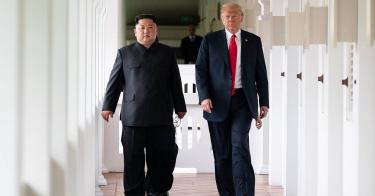A month after the Trump-Kim summit in Singapore, euphoric U.S. claims that “there is no longer a nuclear threat from North Korea” are running into North Korean intransigence. The sparse Singapore Communique was a shaky foundation upon which to build a comprehensive agreement to compel Pyongyang to abandon its nuclear, missile and bio-chemical weapons programs.
Secretary of State Mike Pompeo’s post-summit mission to Pyongyang was meant to put meat on the bare-bones summit agreement. His trip was a critical test of how much the two leaders had actually agreed to. Pompeo needed North Korea to affirm—publicly and unambiguously—that it would abandon its WMD arsenals in an expeditious manner. Such a declaration would combat mounting skepticism, which had been fueled by evidence that the regime was expanding its nuclear and missile programs.
Pompeo asserted that he’d made progress, only to see Pyongyang unleash a lengthy and vitriolic rebuke within hours. The regime categorically rejected Trump administration proposals, accused Washington of violating the spirit of the Singapore summit, and threatened to retract its denuclearization pledge.
It is clear that the United States and North Korea remain far apart over even the definition of “denuclearization,” let alone the sequencing, linkages and timeline for achieving it. North Korea’s insistence on addressing its security concerns prior to implementing denuclearization runs counter to U.S. policy and statements by senior Trump administration officials.
As a prelude to a formal peace treaty, Pyongyang is demanding that the United States first improve bilateral relations and provide security assurances, including signing a declaration ending the Korean War.
Yet, despite its harsh missive, Pyongyang didn’t totally pull the plug on diplomacy. The regime did, however, express a clear preference for dealing only with President Trump, trying to decouple Pompeo from the process. By praising Trump and criticizing Pompeo, Kim Jong-un seeks to distinguish support for the president from his unwillingness to implement the agreement they reached in Singapore.
The diplomatic path with Pyongyang remains open, but it will be far longer and bumpier than has been depicted by the Trump administration. The United States should maintain maximum pressure until Pyongyang makes significant, tangible steps toward denuclearization. Washington must also continue to confront the regime on its human-rights violations.
This piece originally appeared in The National Interest



